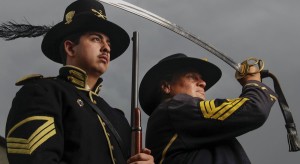
Ashes of Medal of Honor recipient will be moved to Miramar Natl Cemetery
As a Union Army cavalryman, Pvt. Charles Schroeter went to battle in a heavy blue wool jacket with gold braid.
His weapons were a saber, a short rifle and — when the situation turned desperate — a revolver.
At least a dozen Civil War enthusiasts will be dressed in the same fashion when Schroeter is laid to rest by the Army at Miramar National Cemetery on Thursday — nearly a century after he died and his ashes were left to languish in an unmarked San Diego crypt.
One re-enactor said the old soldier deserves recognition because he donned a uniform and put his life on the line for the then-young nation.
“(This country) is worth something. It’s worth dying for, and a lot of people have done it,” said Bill Schurmann, whose group who portrays the 2nd U.S. Cavalry Regiment. “And these people need to be honored, and their memory needs to be honored. And that’s what we do.”
Schroeter’s story has captured the imagination of San Diego military veterans and the county’s tight-knit Civil War community.
His tale is especially interesting for two reasons.
First, Schroeter is the recipient of the Medal of Honor, the nation’s highest award for combat valor, for his service during the Indian Wars. He is credited with gallantry in action against Apaches in a fierce 1869 firefight in Arizona.
Today’s recipients of the medal are minor celebrities whose deaths would not go unheralded.
Second, it’s a great mystery why the career Army soldier wasn’t buried properly.
He had life insurance. And, he had a right to a place in the Grand Army of the Republic plot at San Diego’s Mount Hope Cemetery.
Instead, his ashes went unclaimed. They ended up in the basement at Greenwood Cemetery in southeast San Diego until a series of people interested in military history brought the situation to light.
A dozen or so re-enacters have asked to be part of the Army ceremony scheduled for 9 a.m. Thursday.
On Wednesday afternoon, Schroeter’s ashes will be received by an Army honor guard during a brief, solemn ceremony at the Miramar cemetery.
A hearse, accompanied by the Patriot Guard Riders, will deliver the remains from Greenwood, where they have rested in an unmarked crypt since 1921.
Born in Germany, Schroeter immigrated to the United States as a young man just before the Civil War broke out.
In 1863, he enlisted on the Union side in Missouri at age 25. Soon, he would be fighting Confederate forces across Arkansas with the U.S. Cavalry’s 1st Division.
After the Civil War ended, Schroeter enlisted again, this time in the newly formed 8th U.S. Cavalry Regiment
He headed west, to Arizona, to fight in the Indians Wars and protect American settlers and their wagon trains.
After more than 30 years in U.S. Army and Marine Corps uniforms — but never married and without children — Schroeter retired as a sergeant in 1894.
He opened a confectionery and cigar shop in Buffalo, N.Y., with a business partner, who later died.
The partner’s family embraced Schroeter, and he moved to San Diego to live with them in 1918. By 1920, he resided in a house in Mission Hills on Jackdaw Street.
He will be the first Medal of Honor recipient to be buried in the new Miramar veterans cemetery — but not the only Civil War soldier.
Schroeter will join Edwin Ware, who fought for the Union side, too. Ware’s remains were moved to Miramar in 2013 after a long family dispute.
The stories of Schroeter and Ware and the inglorious, rugged life of an early American soldier are close to the hearts of San Diego’s Civil War devotees.
In the history of American wars, the Civil War stands apart to them. It was fought on home soil. It turned brother against brother, in some cases.
And it mattered because it pointed the young United States on its future path.
“It’s my firm belief that if it wasn’t for that terrible war, our country would not be as strong as it is today,” said Will Tisch of the Sons of Union Veterans of the Civil War, whose members will attend Thursday’s ceremony.
“After that war, the healing that went on made this country very, very strong — not only militarily, which was important in winning subsequent wars, but also it set precedent for the nation’s course.”
